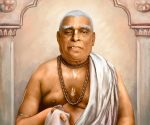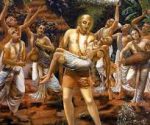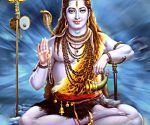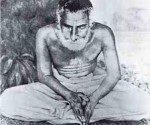Appearance of Sri Sita Devi
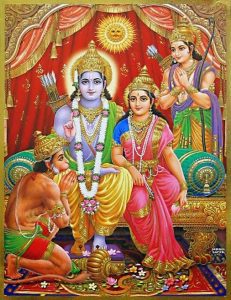 Excerpt from Ramayana Part 1 Chapter 4
Excerpt from Ramayana Part 1 Chapter 4
Janaka continued speaking to the sage and the princes, who listened with great curiosity. “Once I was performing a sacrifice to please the gods in order to get a worthy successor in my line. As the sacrificial ground was being prepared with a golden ploughshare, a wonderful child appeared from out of the earth itself. This female child, who became known by the name of Sītā, grew up in my palace as my daughter. Her beauty is matchless. I have raised Her with love and will give Her in marriage to whoever can show exceptional prowess. Various rulers and princes have approached me and sued for Her hand. Seeing these kings, I set a standard for winning Sītā, saying, ‘Whosoever can hold and string the mighty bow of Śiva will win this princess.’
“Many proud kings thought they would easily bend the bow. However, coming before that bow they were soon shorn of their valor and pride. They were hardly able to move the bow even slightly, far less lift and string it. Angry at their failure, numerous kings together besieged Mithila for one full year. When my resources were exhausted I prayed to the gods for support. I then received from them a vast army equipped with every kind of weapon. That celestial army quickly dispersed those bellicose kings in all directions. Thus this bow remains here, unconquered and awaiting some truly powerful king.”
Janaka looked at the two royal brothers. Rāma’s fame had reached him and he felt sure that the prince would win his daughter’s hand. As the king beheld Rāma’s beautiful features, His powerful physique and noble bearing, he longed for the prince to pass the test and become his son-in-law. He stood before Viśvāmitra with folded palms. “Come now, O sage, and bring these boys with you. If any can string the bow, then the hand of the divinely born Sītā will be won.”
Janaka led them to the part of his great palace where the bow was kept. It was stored in an iron chest which was adorned with gold engravings and covered over with numerous flower garlands. Three hundred powerfully built men somehow managed to move the chest to the center of the hall where it lay. Janaka turned towards Rāma. “Here is the wonderful celestial bow. It has been kept and worshipped by the Janakas for many generations. Not even the gods, demons, Yakṣas, Gandharvas or Kinnaras can string it; how then could any ordinary man? Gaze now upon this bow, O Rāma.”
Janaka ordered that the chest be opened. As the lid was lifted the brilliant bow was revealed. It spread a golden glow all around. Constructed of pure horn, it was skillfully worked with gold and silver images of the pastimes of the gods. Hundreds of golden bells and ornaments hung from the bow, which was studded with diamonds and other gems.
Seeing the bow the two princes gasped in appreciation. Rāma bowed down in respect and then walked slowly around it. He looked towards Viśvāmitra who nodded slightly. Understanding Viśvāmitra’s indication, Rāma stood with joined palms at the bow’s center. He turned to Janaka. “I wish to attempt your test. I shall now try to lift this heavenly bow to gauge its weight and strength.”
While being extolled by Viśvāmitra and other sages, who uttered “Victory! Victory!” Rāma placed his hand upon the bow. There was complete silence in the hall. Janaka held his breath as Rāma stood motionless. Viśvāmitra, knowing the extent of Rāma’s power, smiled slightly.
In the balcony of the hall stood Sītā. She looked at Rāma, feeling a natural attraction for the prince. Until then She had never been interested in any of Her suitors, although the most powerful kings from all around the world had come there. To the gentle Sītā they were all arrogant and overly proud of themselves. Sītā was deeply religious. All Her life She had prayed that Viṣṇu might become Her husband. As She watched Rāma approach the bow She felt Her love for the Lord being awakened. Was this Viṣṇu himself? Becoming absorbed in Her loving sentiment, Sītā felt anxiety. Would Rāma string the bow and become Her husband? She held the matrimonial garland with trembling hands.
Suddenly Rāma seized the bow by its middle part and raised it high above His head. A gasp of astonishment filled the hall. It was inconceivable. Rāma tossed the bow slightly to gauge its weight. Placing one end of the colossal bow on the ground, Rāma then moved to the other end and strung it. He pulled the string and bent the bow round into a semi-circle. It broke suddenly and a sound like the crash of thunder reverberated around the hall. The earth shook as if there were an earthquake. Everyone was stunned and rendered senseless for some moments.
Janaka was amazed. He turned to Viśvāmitra. “I have now witnessed Rāma’s strength. His achievement is incredible. Having secured Rāma as Her husband, Sītā will bring undying fame to my family.”
Janaka’s eyes were filled with tears. Surely Rāma was a divine personality. There could be no doubt. Till then no king had been able to move the bow even slightly; some could hardly even look upon it. But Rāma had handled it as if it were a piece of bamboo. The king looked up to Sītā in the balcony. She was filled with delight upon seeing Rāma’s feat and Her breast heaved with excitement. Awaiting Her father’s indication to come down, She stood surrounded by Her many female attendants. Janaka turned to speak to Rāma, who stood peacefully, having replaced the broken bow in its chest. “I shall now fulfill my pledge to give Sītā’s hand to whoever could string this bow. Sītā is dearer to me than my own life, but I gladly offer Her to You.”
Sītā came down from the balcony with a garland of golden flowers in Her hands and stood by Her father. She was resplendent in a silk sari of deep maroon, a necklace of pearls shining on Her breast. As She walked Her golden anklets tinkled and her diamond earrings swung to and fro. Smiling gently, she shyly lifted her eyes a little and looked at Rāma, who caught Her glance. Both felt Their hearts moved by love. In that moment Their union was forged. Sītā’s father signaled and She went before Rāma. She placed the garland around His neck, indicating Her acceptance of Him as Her husband. She blushed slightly and kept Her eyes down. Walking slowly, She went back to her father, who felt as if his heart might burst with happiness.
The king wanted to perform the marriage ceremony as soon as possible. He asked for Viśvāmitra’s permission, and when the sage agreed, the king arranged for swift messengers to go to Ayodhya to inform Daśaratha.
The ministers of Janaka left immediately and arrived at Ayodhya after three days. They quickly went to the palace and were ushered into the presence of Daśaratha, who appeared to them like a powerful god. Put at ease by the emperor’s benign expression and gentle words of welcome, the ministers politely told him of the events in Mithila. The emperor was delighted to hear the submission of Janaka’s envoys. Rāma and Lakṣman were well! They had conquered over the demons, and more than that, Rāma had now won the beautiful Sītā for His bride.
Daśaratha recalled how he had been contemplating the marriage of his son even as Viśvāmitra had arrived at his palace. The sage must have been sent by Providence, by whose arrangement this union had surely been made. After consulting with his counselors, Daśaratha made up his mind to leave the next day for Mithila.
Taking with him his ministers and preceded by a party of priests, Daśaratha went the next morning towards Mithila, with his army marching close behind. They arrived after five days. Daśaratha approached Janaka, who graciously received the abundant riches brought as gifts. Janaka embraced the emperor, and the two old friends sat together discussing the wedding. Janaka told Daśaratha how Sītā had appeared from the earth. He also told him of a prophesy he had heard.
“Once the celestial seer Nārada informed me that Sītā is Viṣṇu’s eternal consort and that he would one day become Her husband in this world. I thus devised a test which would only be possible for Viṣṇu to pass. Your son has now passed that difficult test and must therefore be Sītā’s eternal husband.” Daśaratha was again astonished to hear of Rāma’s divinity. He still found it hard to believe, having raised Rāma as his child. He looked at the son who stood before him modestly with bowed head and folded palms. Daśaratha was overpowered by love. His loving sentiments overcame any thoughts of Rāma’s divinity. The emperor looked again at Janaka and said, “I approve this marriage in every way. Perform the ceremony under the guidance of learned Brahmins. O king, the success of a gift depends upon the way it is given. Therefore be sure that all the necessary rites are properly observed without loss of time.”
Daśaratha wanted to ensure that the marriage ceremony was performed carefully according to scriptural codes. He did not want any ill fortune created by neglect of sacred rituals. Such errors would blight the marriage and create future difficulties for the couple.
Janaka issued instructions to his ministers and then sat with Daśaratha in his great palace hall. Both of them listened as Vasiṣṭha recited Rāma’s family lineage. After hearing of Rāma’s ancestry, beginning with the sun-god, Janaka recited Sītā’s genealogy, describing his own ancestry, which began with Brahmā.
When Janaka finished, Viśvāmitra spoke. He suggested that Sītā’s sister, Urmila, wed Rāma’s brother Lakṣman. The sage also advised that Janaka’s brother Kushadhvaja allow his two daughters to marry Bharata and Shatrughna. Then there could be one ceremony for all four marriages.
Rising from his seat with joy, Janaka said, “Let it be so!” again and again. He fell prostrate before Viśvāmitra and said, “I am ever your servant. Your words are worthy of my worship and I stand commanded by you. Let the wedding take place tomorrow, a day marked by favorable stars.”
As the two kings sat talking together, the sun gradually set. Janaka took his leave from Daśaratha and departed for his personal quarters, flanked by his ministers and a hundred warriors. Thousands of golden oil lamps lit up the hall as the crowds of Brahmins made their way out, all of them constantly uttering auspicious Vedic hymns.




